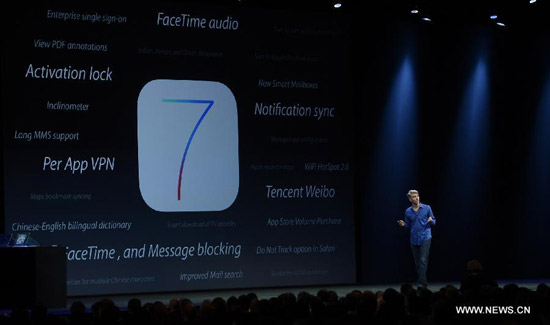
 |
| pple's Senior Vice President of Software Engineering Craig Federighi addresses the 2013 Apple WWDC at the Moscone Center in San Francisco, California, the United States, on June 10, 2013. (Xinhua) |
Apple Inc has integrated Tencent Holdings' microblogging service into its newly unveiled operating system iOS 7, highlighting the company's focus on the Chinese market and heating up the competition between China's two largest microblogging service providers, an industry analyst said Wednesday.
During Apple's 24th annual Worldwide Developers Conference held Monday in San Francisco, Craig Federighi, Apple's senior vice president of software engineering, unveiled new iOS 7 features including the integration of Tencent Weibo for users in China. The final version of iOS 7 will be available this fall.
Sina Weibo, Tencent's major competitor in China, was integrated into iOS 6 last June.
"Microblogging services are the most popular social media sites in China, based on their huge number of users, so Apple has chosen one more microblog product rather than social networking platforms renren.com or kaixin001.com," Xiang Ligang, chief executive of telecom industry portal cctime.com, told the Global Times Wednesday.
"The move will further intensify the competition between Sina and Tencent, the two largest microblogging service providers in China," he said.
Tencent Weibo had 540 million registered users by the end of 2012, while Sina Weibo had 503 million, according to figures provided by the two Internet companies.
Tencent's spokesperson was unavailable for comment Wednesday.
In addition to Tencent Weibo, other new iOS 7 features catering to Chinese users include a Chinese-English bilingual dictionary and improved Chinese input including handwriting recognition for Chinese characters, the company said at the conference.
Although Federighi described iOS 7 as "the most significant iOS update since the original iPhone," industry reviewers and Apple fans have been giving it mixed reviews.
Some criticized the California-based company for lack of innovation or even copycatting features of the Android mobile operating system, while others eagerly rushed to update their iPhones with a test version of iOS 7.
"Apple has lost its appeal due to lack of innovation since the company's former CEO Steve Jobs passed away," Ding Daoshi, deputy managing editor of IT information website sootoo.com, commented on his Sina Weibo Tuesday.
Xiang said the new features indicate Apple's focus on the Chinese market, where it is facing an increasing threat from Samsung.
China's smartphone shipments surged 86 percent year-on-year to 67.4 million in the first quarter of 2013. Samsung topped the country's smartphone sales with 12.5 million units, while Apple ranked only sixth with an estimated 6.1 million iPhones sold during the three-month period, the latest data from consultancy Strategy Analytics showed.
"China is Apple's second largest market in terms of sales revenue, so it is betting on Chinese consumers to boost gadget sales," he said.
"But in China ... I don't think many consumers will make purchases just based on an updated operating system," Xiang noted.
















 Turn white rabbit to 'gold' - A young entrepreneur's goal
Turn white rabbit to 'gold' - A young entrepreneur's goal


![]()
